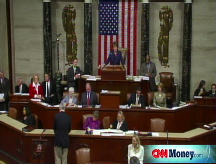BofA to slash mortgage payments
The foreclosure prevention program is the most aggressive initiative undertaken yet to help stem the housing crisis.
| 30 yr fixed | 3.80% |
| 15 yr fixed | 3.20% |
| 5/1 ARM | 3.84% |
| 30 yr refi | 3.82% |
| 15 yr refi | 3.20% |
NEW YORK (CNNMoney.com) -- A plan announced today by Bank of America will be the most aggressive foreclosure prevention effort ever undertaken by a U.S. bank.
The program, scheduled to start in December, will be open to distressed borrowers who signed up with Countrywide Financial between January 1, 2004 and December 31, 2007. Countrywide was acquired by Bank of America (BAC, Fortune 500) in July.
It came in a legal settlement that the company entered into with the attorney general offices of 11 states, who had sued Countrywide over predatory lending practices, but the company stated that borrowers in all 50 states will be eligible to participate in the program.
"The Countrywide settlement is a watershed moment for loan modification programs," said Mark Pearce, North Carolina's Deputy Commissioner of Banks and a member of the State Foreclosure Prevention Working Group. "This is, by far, the best [program ever], even better than the FDIC program with IndyMac Bank."
As part of the initiative, Bank of America will cut monthly housing payments, including mortgage, property taxes and insurance, to no more than 34% of gross income. The move is expected to help keep as many as 400,000 troubled borrowers in their homes.
The program targets holders of subprime adjustable rate mortgage (ARMs), subprime fixed rate loans and option ARMs, but prime and Alt-A borrowers, who did not document their income, will be eligible as well.
No other foreclosure prevention effort has aimed to keep borrowers' house payments so low.
"[The program's] affordability is far better than any other program out there," said Rick Simon, spokesman for Bank of America.
By contrast, the much heralded foreclosure-prevention initiative announced in August by the FDIC for customers of IndyMac Bank, the subprime lender that the agency took over in July, said it will keep borrower payments to no more than 38% of gross income.
"This is the biggest mandatory modification of loans in U.S. history," said Jerry Brown, attorney general of California, the state with the largest number of borrowers who may benefit from the settlement. "Of course, we never saw such a big rip-off by any other company either."
According to Simon, the Countrywide program will proactively screen all of its borrowers for eligibility, and then contact them directly to offer loan workouts. No prepayment penalties or modification fees will apply. But the program can't help every Countrywide borrower. Some, because of illness, divorce, job loss and the like, simply won't be able to afford any reasonable mortgage payment.
Simon added that Bank of America is training personnel and putting systems into place that it hopes will enable staff to deal with a large number of mortgages all at once.
The new program comes with a price tag of $8.4 billion, but Simon says that it will cost much less than foreclosing on homes en masse.
As the credit crisis continues, more and more lenders and mortgage servicers are coming to grips with the fact that preventing a foreclosure is usually cheaper than going through the repossession process and then reselling the property in a declining market.
Depending on each borrower's circumstances, Bank of America might freeze or lower a loan's interest rate or even cut the principal loan balance. The bank said it will also participate in the government's Hope for Homeowners program, a provision of the housing rescue bill which went into effect Oct. 1 and makes FHA-insured loans available for delinquent borrowers.
The announcement of the program came on the heels of Friday's approval of the $700 billion Wall Street bailout, a measure which has been criticized for failing to address the foreclosure crisis head on.
The hope is that other lenders and servicers will follow Countrywide's lead.
"Now that we've gotten this with Countrywide, I would expect that we'll be talking with other major servicers to implement similar programs in the near future," said North Carolina Deputy Commissioner of Banks Mark Pearce, who worked on this settlement.
But he and other members of the the State Foreclosure Prevention Working Group have been pushing other lenders to do something this drastic for months, without much luck.
"So far, they have failed to show the leadership required to get it done," said Pearce. "I hope, having the market leader do this will spur the other servicers to greater action." ![]()



